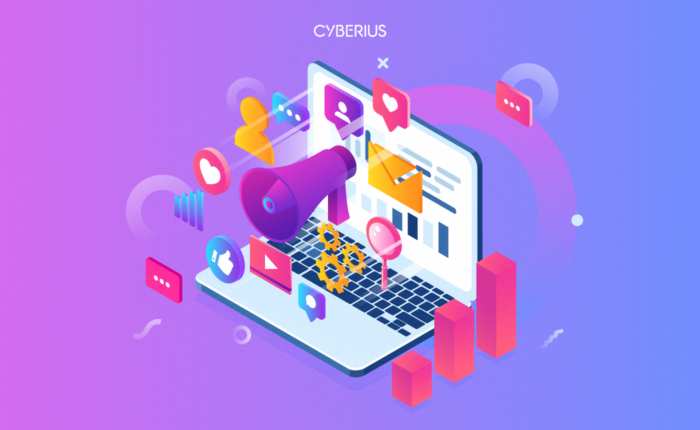Powerful Digital Marketing
Digital marketing is the lifeblood of any online business, and if you want to excel at it, you might want to read up a bit, and keep up with digital marketing trends.
Any digital effort for online marketing is called digital marketing.
This can range from email marketing to infographics, and more. It can help more people engage with your personal branding and business.
Good content marketing also helps with your SEO, so your page is organically found easier in the Search Engine Results Pages (SERPS).
One powerful strategy today for online brands and businesses is to build a digital community. And to get your community involved with the company by using proper social media engagement tactics.
Here’s a great infographic from Social Media Today about 50 media tips to help promote your brand.
The convergence of marketing with technology has been coined by some as MarTech.
What Is MarTech?
As mentioned, MarTech is the converging of marketing and technology – perhaps a more well-known term for it would be digital marketing.
Unlike traditional marketing, digital marketing, or MarTech, uses a variety of digital technologies online. MarTech may not be for every business, and there are certainly ways to do it wrong.
But if you’re an online business, then a good MarTech strategy is necessary for growth and expansion.
MarTech Today
Digital marketing seems to be an ever-growing field, always trying to connect in the best possible way with your target audience.
There are many digital marketing strategies out there. A growing one being the use of online celebrities to promote your product or business. This is called Influencer Marketing (which of course can be used in traditional marketing as well).
This type of marketing has the advantage of connecting your business or brand with a highly respected individual with a large number of followers.
Social media has seemingly become a “must” these days, with companies using the likes of Facebook, Twitter, Instagram, LinkedIn, and others to connect with their audience.
Instagram is great for fashion bloggers, foodies, travelers, tc. Facebook is great for general information, contacting through messages, and for community conversations via posts & comments.
Twitter is more for quick updates, and more restricted conversations (it has a much shorter character limit). All three of the aforementioned are best for B2C marketing.
LinkedIn, on the other hand, was designed from the get-go for B2B marketing, for businesses and professionals to connect.
Marketing Technology
Today, companies and freelance marketers have an overwhelming amount of MarTech tools at their fingertips. Here’s growth.org’s top 50 marketing tech companies.
There’s also a number of technologies that have the potential to improve digital marketing capabilities. For example:
Video Marketing:
Videos are increasing in popularity, and it’s no wonder. Who doesn’t like to watch videos?
They’re engaging, often easy to remember, and allow ideas to be fully explained and played out right in front of your eyes.

If you want a piece of the pie… better make some videos 🙂
The following picks (except the last) are from Martech.zone:

Big Data
Big Data refers to the massive amount of information that is collected from anyone on the internet. Some would consider it extremely invasive & intrusive, yet it is there, and our choices on the internet are largely responsible.
Much of this information is available for businesses to take advantage of with highly targeted ads (personalized ads).
Artificial Intelligence (AI)
AI technology could greatly enhance marketing in the future (and it already is).
AI can make sense of Big Data and can make fast & highly accurate decisions based on available information.
Machine Learning
It is a branch of AI, but it extends the meaning beyond just machines making processing decisions. Machine learning also means that machines can learn without constantly being supervised.
See how some companies are already utilizing it for their marketing campaigns.
There has been growing alarm among some (the most famous probably being Elon Musk) about the potential dangers of AI and Machine Learning.
Famous AI robots, like Sophia, and also not-so-famous ones have been caught saying dark and sinister things about humanity. Have these AI robots been scripted to say such things? Are they being controlled? Is it really just a sense of humor? Or are they somehow picking up some very bad ideas on their own?
Combine this with drones, advanced weapons & technology, & other robotic advancements, and it’s easy to see why some people are starting to get concerned.
You can look up the research, strange happenings, and concerns for the future yourself, but for now we’ll leave this section with just two words: The Terminator.
Bots
Bots (not killer bots) can use readily available data to help with customer inquiries, and can relatively easily be integrated into websites and social media channels.
But please, do not use this as a means to avoid human interaction. Doing so would be extremely annoying to customers who actually need to talk to someone. This would not be a good marketing strategy.
Voice Search
Voice Search is growing in popularity. On a basic level, Voice Search simply uses your voice to search the internet rather than typing.
Many people are phrasing their search inquiries in a more conversational manner, meaning that voice search may be influencing the way that keywords & keyphrases are used.
Virtual Reality and Augmented Reality
In case you’re not sure of the difference, Virtual Reality (VR) is a completely immersive digital experience, completely shutting out the real world.
Whereas Augmented Reality places digital elements within a screen of the real world. Virtual Reality is already being used for things like real estate tours, but it’s a bit more difficult for marketers to implement VR, as it’s a full digital emersion and also requires a clunky headset.
Maybe marketers can create a game that markets your product? Augmented reality on the other hand has a little more obvious implications.
For example, it can display product information, photo add ons, help you see what furniture would look like in your house, etc. It can be integrated with any type of device with a screen and a camera.
Internet-of-Things (IoT) and Wearables
Marketers can use internet connected devices and wearables to gather Big Data information.
It’s also plausible that marketing messages could be sent do wearable devices, such as happens with your cell phone, when you get text messages from local businesses with special offers whenever you get within close proximity.
Blockchain Technology
Marketers could use blockchain technology to track advertisements, and to help keep audiences engaged with them as well. Here’s some more ideas on blockchain marketing.
Beacons
Businesses use beacons (proximity marketing technology) to send messages to smartphones that are within a certain distance.
It’s been estimated that the number of these beacons will reach 400 million by 2020.
5G
Although we are including 5G to this list, it should be noted that many have expressed concern over this technology.
Concern over the potential known and unknown health risks of exposing the population to increased radiation. 5G’s radiation is a much higher frequency than existing networks, & must be placed within close proximity to users.
Potential risks could include higher risks of cancer for communities, and more.
Among others (see extra resources at the bottom of the article). But the limits will be pushed regardless of the likely negative consequences to people & the environment.
The wishes of communities will unfortunately be ignored, the public’s health will not be put first, & the majority will remain ignorant of the potential dangers.
If allowed to continue, 5G will provide even faster service that marketers may be able to take advantage of… whoopty-do.
Quantum Computing
Quantum Computing is still extremely new, and has only started to be made available to the public in recent times (such as IBM’s first commercial quantum computer).
Essentially, quantum computers can process much more data much more quickly, and can do multiple tasks simultaneously (very over simplified).
They’re even supposed to be very secure. We’re pretty sure marketers will find good use of these machines as they roll out more in the future. You can even utilize them on the cloud.
Conclusion:
MarTech can be an exciting subject (if you’re marketing geeks like us), and upcoming technology will provide greater opportunities for marketers to reach their target audiences.
Things like infographics and building digital communities will likely still be important, but the opportunities will be expanded.
For those who aren’t marketing geeks, but you know that you need to up your SEO and marketing game, you may want to check out this article about how to choose an SEO company.
Alternatively, you can also reach out to us and let us know your company’s needs, and we’ll be happy to give you a quote. Our main site, as of the time of this writing, is down for maintenance, but we’ve set up a temporary landing page in the meantime were you can contact us and view our services. We hope you enjoyed this article!





Leave a Comment